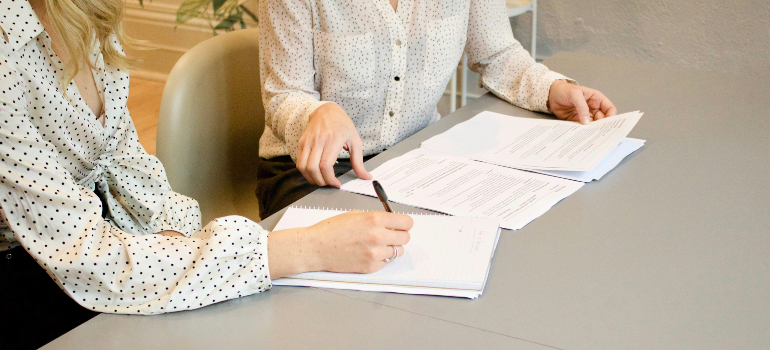How to Establish Residency After Moving Abroad
Let's TalkAre you planning to move to another country with Interstate Relocation and need to establish residency after moving abroad? This critical step ensures you can legally live, work, and access services in your new home. Our guide simplifies the complexities of this process, detailing each necessary action. From understanding varied residency requirements and preparing essential documentation to choosing the right visa and integrating into the local community, we cover it all. Follow these straightforward steps, and you’ll navigate this transition smoothly, setting yourself up for a successful new chapter in your life.
What Are the Residency Requirements in the New Country?
Residency is a legal term describing your status as a recognized inhabitant of a country. As a resident, you gain rights and responsibilities, such as the ability to work legally, access public healthcare, education systems, and other services crucial for day-to-day life. It also affects your tax obligations and the extent of your interaction with government agencies. For those moving abroad, securing residency is often the first step toward integrating into the new country and is essential for long-term stability.

Factors Influencing Residency Requirements
The criteria for obtaining residency can vary widely from one country to another and are influenced by several factors:
- Type of Residency: Some countries distinguish between temporary and permanent residency, each with its own set of requirements.
- Purpose of Stay: Your reason for moving—such as employment, education, family reunification, or retirement—can affect the type of residency you’re eligible for.
- Nationality: Some countries have agreements that make it easier for citizens from certain nations to obtain residency.
- Investment Requirements: Some nations offer residency options to individuals who invest a certain amount of money in the country.
- Legal and Security Checks: Background checks, health examinations, and other security procedures are commonly required to assess eligibility.
Researching Residency Requirements
When navigating your international move, it’s crucial to gather accurate and specific information about the residency requirements in your new country. Here’s how you can do this:
- Official Immigration Websites: These are valuable resources for up-to-date information on residency requirements and application procedures.
- Embassies and Consulates: Contacting your home country’s embassy or consulate in the destination country can provide personalized guidance and sometimes assistance with the application process.
- Legal Advice: Consulting with a legal expert specializing in immigration law can provide insights tailored to your personal circumstances and help avoid common pitfalls.
- Community Forums and Expatriate Networks: Engaging with others who have undergone similar moves can offer practical advice and firsthand experiences.
By understanding these elements, you can better prepare for the residency application process and set yourself up for a successful transition to your new home.
What Documentation Do You Need to Prepare for Residency?
When you move to a new country, preparing the correct documentation is critical to establish your residency smoothly. This process can be intricate, but knowing exactly what to gather can save you time and stress. Let’s break down the essential documents you’ll need.
Identification Documents
Firstly, the most important documents are your identification papers. You must have a valid passport with extra validity beyond your intended stay. Also, bring your birth certificate and if applicable, marriage or divorce certificates. These documents prove your identity and personal status, which are fundamental for any legal process abroad. Make sure these documents are current and certified copies; some might need an apostille or similar certification depending on the country’s requirements.
Financial Stability and Employment Proof
This is usually required to ensure that you can support yourself without accessing public funds. Documents you might need include recent bank statements, an employment contract if you’re relocating for work, or proof of income from your home country. If you’re planning to retire abroad, documents related to your pension or other retirement funds are necessary. Sometimes, you may also need to show a rental agreement or property ownership to prove you have a place to live.
Health Insurance and Medical Documentation
You will need to provide proof of a health insurance policy that meets the minimum requirements of the host country. This policy should cover a wide range of medical services, ensuring you are protected from large medical bills. In addition, some countries require a full medical check-up before granting residency. This might include vaccinations, blood tests, and other health screenings. Prepare to have these medical results available and ensure they are done according to the specified standards of your new country.
Double-check each requirement and keep multiple copies on hand to avoid any potential delays in your residency application process.
Which Visa is Suitable for Establishing Long-term Residency?
The type of visa you need depends on your reasons for moving and your long-term plans in the new country.
Overview of Visa Types and Residency Implications
Visas are categorized based on the purpose of your stay. Common types include work visas, student visas, family reunification visas, and retirement visas. Each type affects your residency status differently. For instance, work visas are typically linked to your employment status, while retirement visas may require proof of financial independence.
Determining the Most Suitable Visa for Long-term Residency
If you’re employed by a local company, a work visa will be necessary. If joining a family member, a family visa is required. Each visa has specific eligibility criteria and benefits, so it’s important to match your situation with the right visa to support your residency goals.
Visa Application Procedures and Requirements
Applying for a visa involves several steps. First, gather all required documents, such as passports, proof of employment, financial statements, and any required legal clearances. Check the embassy’s website of your destination country for detailed application instructions. Submit your application well in advance of your planned move to allow ample time for processing. It’s also wise to consult with an immigration lawyer if you encounter complex issues or delays.
How Do You Establish Legal Ties to the New Country?
Establishing legal ties is a crucial step in making your move permanent. Here’s how you can start setting up these important connections.
Opening a Local Bank Account
Opening a bank account in your new country is one of the first steps you should take. It not only facilitates easier management of your finances locally but also serves as proof of your economic presence in the country. To open an account, you will need your identification documents, proof of address, and sometimes a minimum deposit. This account will be essential for receiving salaries, paying bills, and handling everyday expenses.
Registering for Utilities and Services
Once you have a place to live, registering for essential services like electricity, water, and internet helps further establish your residency. These services require a contract in your name, which can often be used as additional proof of your address. You will typically need to provide your identification, a lease or proof of home ownership, and sometimes a security deposit. Getting these services set up not only makes your home livable but also ties you legally to your new address.
Obtaining a Local Driver’s License or ID
These IDs are often necessary for daily activities such as driving, banking, and accessing healthcare services. Requirements vary by country but generally include passing a written and sometimes a driving test, providing your foreign license, and submitting identification documents.

How Can You Integrate into the Local Community?
Once your Virginia international movers have assisted you in settling into your new home, it’s time to engage with your surroundings and cultivate meaningful connections.
Learning Language and Culture
One of the most impactful steps you can take is to learn the local language. Even basic proficiency can greatly enhance your daily interactions and show respect for the cultural norms of your new home. Additionally, understanding cultural nuances, such as common gestures, holiday traditions, and social etiquettes, can prevent misunderstandings and deepen your connection to the community. Many cities offer language classes at community centers or schools, which also serve as great places to meet people who are in a similar situation.
Participating in Community Events
Attending local events is a fantastic way to immerse yourself in the culture and meet new people. Look for community gatherings, festivals, exhibitions, or workshops that align with your interests. Participating in these events enriches your experience and allows you to contribute to the community, making you feel more at home and less like an outsider.

Building Social Networks and Connections
Start by connecting with neighbors and colleagues, and consider joining clubs, sports teams, or online groups that align with your interests. These connections can provide support, enhance your social life, and open up professional opportunities. Networking can also offer a sense of security as you navigate your new environment, providing both social and practical benefits like recommendations for services or insights into living in the area.
Successfully Establish Residency After Moving Abroad
As you prepare to establish residency after moving abroad it’s wise to enlist the help of reliable residential movers in Virginia to handle the initial relocation tasks efficiently. They can ensure a safe and timely arrival of your belongings, giving you peace of mind as you embark on this new chapter. By following the detailed steps outlined in this guide, you’ll be well-prepared to successfully settle into your new life abroad. Approach each step with patience and organization. This way you’ll find the transition smoother than expected, setting the stage for a fulfilling experience in your new home.
